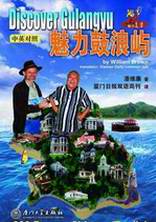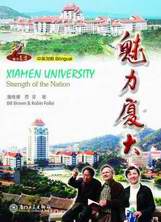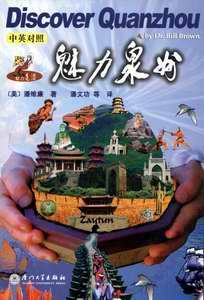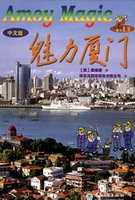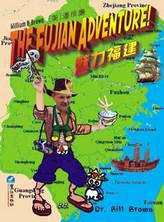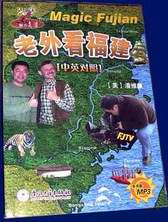![]() Click
to
Access
Click
to
Access
AMOY MAGIC SITE from
OUTSIDE China
![]() Click
to Access Amoy
Magic Site from
Click
to Access Amoy
Magic Site from
INSIDE
China ![]()
TRAVEL
LINKS
![]() Xiamen
Xiamen
![]() Gulangyu
Gulangyu
![]() Jimei
Jimei
![]() Tong'an
Tong'an
![]() Jinmen
Jinmen
![]() Zhangzhou
Zhangzhou
![]() Quanzhou
Quanzhou
![]() Wuyi
Wuyi
![]() #1Fujian
Sites!
#1Fujian
Sites!
![]() Fujian
Foto Album
Fujian
Foto Album
![]() Books
on Fujian
Books
on Fujian
![]() Readers'Letters
Readers'Letters
![]() Ningde
Ningde
![]() Zhouning
Zhouning
![]() Longyan
Longyan
![]() Sanming
Sanming
![]() Putian
Putian
![]() Bridges
Bridges
![]() Travel
Info,
Travel
Info,
![]() Hakka
Roundhouses
Hakka
Roundhouses
![]() Travel
Agents
Travel
Agents
MISC. LINKS
![]() Amoy
People!
Amoy
People! ![]()
![]() Darwin
Driving
Darwin
Driving ![]()
![]() Amoy
Tigers
Amoy
Tigers
![]() Chinese
Inventions
Chinese
Inventions
![]() Tibet
in 80 Days
Tibet
in 80 Days![]()
![]() Amoy
Vampires!
Amoy
Vampires!
![]() Dethroned!
Dethroned!
![]()
![]() Misc.Writings
Misc.Writings
![]() Latest
News
Latest
News
![]() Lord
of Opium
Lord
of Opium
![]() Back
to Main Page
Back
to Main Page
Copyright 2001-7 by Sue Brown & Dr.
Bill ![]() Order
Books
Order
Books
Note:
Please click thumbnails
for larger photos!!
![]() Amoy
Hill's Photos
Amoy
Hill's Photos![]()
![]() AmoyMission-1893
AmoyMission-1893
NARRATIVE OF EXPLORATORY VISIT TO CONSULAR CITIES OF CHINA
(1844, 1845, 1846)
BY
REV. GEORGE SMITH, 1857 Scanned
by Dr. Bill Brown
![]() Chap
25 Departure to Amoy
Chap
25 Departure to Amoy ![]() Chap
26 Daily Occurrences at Amoy
Chap
26 Daily Occurrences at Amoy
![]() Chap
27 New Year Festivities
Chap
27 New Year Festivities ![]() Chap
28 Visit Amoy High Mandarins
Chap
28 Visit Amoy High Mandarins
![]() Chap
29 Prevalance of Opium Smoking
Chap
29 Prevalance of Opium Smoking ![]() Chap
30 Female Infanticide
Chap
30 Female Infanticide
![]() Chap
31 Daily Incidents at Amoy Cont'd
Chap
31 Daily Incidents at Amoy Cont'd ![]() Chap
32 Mandarins Entertain Missionaries
Chap
32 Mandarins Entertain Missionaries
![]() Chap
33 General Description of Amoy
Chap
33 General Description of Amoy ![]() Chap
34 Depart Amoy for Canton; Opium Problem
Chap
34 Depart Amoy for Canton; Opium Problem
.
CHAPTER
XXVIII. NEW YEAR VISITS OF CEREMONY TO THE HIGH MANDARINS OF AMOY
A Chinese Bride-Visit
to the Te-tok, or Chinese Admiral; his Adroitness in escaping the British
War; his recent Disgrace-The Cham-hoo, or military Commandant; his Discussion
with the Missionaries, and Defense of Idolatry-The Taou-tai, or Prefect,
a Manchoo Tartar-The Hai-quan, or Inspector of Customs, a Manchoo-The
Hai-hong, or Lord Mayor-A Budhist Nunnery-The privileged incorporation
of Beggars.
In the evening of the same day we were invited by Hok-ha, one of our neighbors,
to pay a wedding-visit to his bride, to whom be was married on the preceding
evening. He was a youth of about twenty-one years of age, apparently a
sincere inquirer after Christian truth, and a constant attendant on the
means of grace, both at the chapel and at Mr. Pohlman's family devotions.
His father died eleven years ago, and he was now an assistant to his uncle,
a ropemaker. The latter, on whom he was in a great measure dependent,
had frequently shown his displeasure at Hok-ha's continual absence at
the missionary services; and on one occasion Hok-ha had to take refuge
for more than a week in the house of one of the missionaries from the
harsh severity of his relative. He showed much gratitude, and was evidently
attached to the missionaries. He was in an interesting state of mind,
and lived in the daily habit of prayer. Seven years ago his widowed mother
purchased for him a wife, who had lived in the family ever since, and
was now sixteen years old. His mother commanded her son to celebrate the
nuptials, though he would himself have preferred waiting for two years,
till his prospects were brighter, and he became more independent of his
uncle. But as the old lady was anxious to establish the family, Hok-ha
being her only son, her commands were peremptory, and obedient submission
to her authoritative will became his only alternative. Under the circumstances
of the bride being already an inmate of the family, there was no marriage-procession
to conduct her to the house of her husband; and there had been only the
usual feast and nuptial ceremonies on the preceding evening.
We were ushered by the bridegroom up two or three flights of steps into
his humble apartment, where we took our seats on a couch opposite a table
covered with the remains of a feast. By the side of this table the bride
stood, having her eyes cast toward the ground, and wrapped up in strict
efforts to preserve propriety-custom not permitting a bride to speak to
a visitor till after three days, nor to go out, except to the house of
her parents, till after thirty days. She was a very pretty, interesting
girl, with a profusion of artificial flowers forming a tiara on her head,
and with a handsome, bright-red bridal robe, her face being covered with
pearl-dust, rather beyond the limits of European taste. At her husband's
suggestion she handed to us a plate of sweetmeats from a drawer, of which
we partook by way of compliment. She continued to stand during the whole
of our visit. A glass mirror lay on a dressing-table close by, into which
she directed an occasional glance, to assure her mind of her strict preservation
of appearances. Although my companion once or twice addressed her, she
strictly preserved silence. She appeared, however, sometimes to experience
difficulty in suppressing a simpering laugh, and to be in great danger
of breaking through her affected seriousness. Hok-ha seemed greatly pleased
with his bride. He had renounced idolatry, and stated his determination
to have no idols in his own part of the house. In proof of his sincerity
there were no idols or other symbols of idolatry in the room in which
we were, and which was the only room exclusively belonging to himself.
Jan. 28th.-This being the second day of the new year,
we formed a party of five missionaries, in order to make a visit, and
to pay our respects to the high mandarins of the city. Entering the citadel,
we soon approached the large open area, forming the entrance to the palace
of the te-tok, or admira1. The first court into which we passed consisted
of a large, inclosed, open space, with little outhouses or offices in
a dilapidated state on either side. This was occupied for four or five
days after the capture of Amoy by Sir Hugh Gough and the British troops,
till their removal across to the island of Koo-lang-soo. The troops bivouacked
in this open court; but on the first night, the buildings on the left
were set on fire by the Chinese, The present te-tok, who also, during
the British war, was in power, and possessed the highest authority, naval
and military, was opportunely absent from the scene of warlike operations.
Shortly before the capture of the city, he went out to sea with his fleet
of war-junks, ostensibly to meet the English ships and sink them on the
wide deep; but he contrived to miss the British fleet, and to escape the
dreaded conflict.
When all the local authorities were cashiered and punished by the emperor
for their pusillanimity in suffering the barbarians to capture the place,
the te-tok, under these circumstances, received only a light punishment,
being merely degraded three degrees of rank. But on his memorializing
the throne, and representing that his absence from the scene of war was
more his misfortune than his fault, and was, moreover, occasioned by his
courage and zeal in the public service, he was restored to all his forfeited
honors. Recently, however, he had again been involved in trouble, by having
recommended an unsuitable candidate for military promotion to one of the
national boards at Peking, and had been stripped of all the badges of
his former rank, but not of the power or emoluments of office. We found,
on inquiry from his secretary, that he was absent on some expedition along
the coast, and would not return for six days. He was now absent probably
in order to avoid the mortification of being seen at this holyday season
without the usual badges of his rank, or to endeavor by some signal service
at sea to regain favor at court, which his reported wealth was likely
to insure at a very early period. His naval command extended along the
coast of Fokeen and Chekeang. He had the character of being a confirmed
opium-smoker, and had sometimes come fresh from the fumes, so as to talk
rather wildly to the missionaries amid the confused state of his brain,
boasting of his recent exploits against the pirates, and of his having
cut off a hundred heads.
Our second visit, a few days later, which, for the sake of convenience
and connection I here anticipate, was more successful. He received us
with apparent cordiality. He was a decrepit old man of seventy years of
age, without any of the usual ornaments of official rank, both he and
his attendants being dressed in the plainest style, on account of his
recent disgrace. He smoked tobacco incessantly, his conversation turning
on his recent exploits in Che-keang, where he said that he had captured
between thirty and forty pirates, and the same number also in the neighboring
district of Tung-hwa. He spoke of the pirates being at this time very
numerous. He next directed the topic of conversation to the price of our
furs and dresses. He told us that his own fur came from Russia, and was
of a very rare kind; acquainting us further with the price of the small
piece of fur which faced his cuffs, which alone, be said, cost ten dollars.
In reference to my intended voyage to England, he advised me to hasten
my departure during the prevalence of the north winds, which he seemed
to think would take me the whole voyage to Europe. It was currently rumored
in Amoy that he wanted to resign his command, and to retire to his native
place in the south-western part of Canton province, but that he could
not yet obtain permission to abandon his post. He received, with expressions
of thankfulness, St. Luke's Gospel and a tract; but appeared to possess
very little intellectual capacity, being a very unfavorable specimen of
a Chinese officer.
Our next visit was to the cham-hoo, or militay-commandant, whose official
residence was situated near that of the te-tok. He came into an outer
court to meet us, shaking hands with us separately, and conducted us into
a large inner hall. He wore a light-blue knob on his cap, the badge of
the third rank of military officers. He was the only resident officer
of high rank who was a native of the neighborhood. He spoke the Tung-hwa
variety of the local dialect, which enabled the missionaries to converse
¡êreely with him without the necessity of an intervening interpreter.
Of this they took full advantage, the cham-hoo himself being also very
friendly and communicative. Finding that some of our number bad been originally
resident in Java, he inquired particularly about Calapa (Batavia) and
the Chinese emigrants in that country. He requested information respecting
the condition of the latter, and inquired whether they preserved their
Chinese customs and dress. He also put several questions concerning the
general character and policy of the Dutch government toward the Chinese
settlers. He then inquired about a teacher named Boone, formerly at Amoy;
and mentioned his having had some conversation respecting the United States
with a Chinese, who had accompanied Dr. Boone from Amoy to America. He
mentioned, also, the fact of his having been shown a daguerrotype likeness,
taken in America, and inquired whether the missionaries had the apparatus
for taking likenesses with such wonderful rapidity. He next wished to
hear particulars about a nation of dwarfs, in America, of whom he had
heard. An English missionary present, Mr. Young, who, through advantages
in early youth, now possessed a tolerably perfect knowledge of the spoken
dialect, drew the conversation to the subject of religion, and gave an
outline of Christian doctrines. The cham-hoo, after listening for some
minutes, replied, that their Chinese priests said almost the same things
as the missionaries preached; and that the religions of both Chinese and
foreigners were nearly the same. This led to a renewed explanation of
our doctrines on the part of the missionary. The cham-hoo listened with
politeness for a time; but on the mention of the fall of man, and the
depravity of human nature, he made violent objections to the doctrine,
asserting, with some degree of personal excitement, that his own heart
was correct, and his moral disposition good. The missionary renewed his
subject by the softening preface, "Let not your lordship be offended;"
and proceeded to show that idolatry was sin, and a proof of the fall;
that the pity of God extended to this fallen world; and that the mission
and atonement of Jesus Christ were the divine remedy for the sins and
sufferings of mankind. On this the cham-hoo asked who was Jesus-a god
or a man? He afterward contended, with some warmth, that the Chinese did
not worship idols, but merely made images in remembrance of good men,
whose example they wished to imitate. In the course of his remarks, he
instanced Ma-tsoo-po, the great Fokeen goddess of sailors. In a subsequent
part of their conversation, the missionary asked him how it was that so
many junks which carried her image, in order to consult the weather, and
to obtain good luck, were lost at sea-goddess, crew, and all. He replied
that none could resist "destiny" and the "decree of heaven;"
and that those who worshiped Jesus were also unable to avoid calamity.
He at length turned the conversation to other subjects; two of his attendants
in the mean while appearing to be differently affected by the conversation,
and slipping out of the room to conceal their laughter. He promised to
receive and peruse some of our Christian books, and complimented us on
the excellence of our objects, saying that our religion was calculated
to unite all nations in the bond of peace. After the usual supply of tea
and sweetmeats had passed round, we took leave of him in the outer court,
to which he accompanied us.
Returning from the citadel into the outer city, we soon arrived at the
residence of the principal civil mandarin, the hou-tai, a Manchoo Tartar,
who was adorned with the insignia and opake blue knob of the fourth rank.
Our cards having been sent in, he speedily made his appearance at a flight
of steps in the outer court; and, after shaking hands, conducted us to
an inner room, where he continued standing till we were all seated, and
then himself occupied the lowest place. He lately served as che-foo in
Szechuen province, and came to Amoy on his promotion. He made many inquiries
about our respective countries, and seemed to he much impressed by the
fact of our religion appearing to unite us in the bonds of fraternal affection,
though we belonged to different nations. He inquired the number of years
that had elapsed since the separation of the United States from Britain,
and expressed a wish to obtain some maps of foreign lands, with the names
written in Chinese characters, which I subsequently sent him as a present.
Finding that, of the seven missionaries now resident at Amoy, three were
English, he remarked that we were better off than he was in this respect,
as he had only one Manchoo fellow-countryman, the hui-quan, besides himself
at Amoy. He said that there were about thirty-four Ma-choos holding office
in Fokeen province,-and also between four and five thousand Manchoo soldiers.
He made inquiries about Mr. Abeel, who, he said, had supplied him with
Christian books three years ago.
[The Chinese at the present
time frequently express dissatisfaction with the diminished amount of
encouragement which literature receives in the promotion of officers on
the claims of literary merit. Under the preceding native dynasty, they
say that all political offices were conferred on the literary graduates,
but that under the present foreign dynasty, out of every ten offices of
government, about three are given to Manchoos from birth, one to wealthy
persons willing to purchase promotion by bribery, and only six to Chinese
graduates, irrespectively of birth or wealth. The Manchoo dynasty is thus
gradually closing up the only safety-valve for the ambition of native
patriots, and is exposed to serious danger from this outrage on public
opinion.]
The hai-quan, or inspector of customs, a Manchoo, whom we next visited,
was absent from home; but, in common with the rest of the mandarins, sent
his cards to each of us the next day, by way of returning our compliment.
From this point we sailed in a boat to the suburb of Ha-mun-ka, to pay
our respects to the Hai-hong. He received us with the same condescension
and kindness which we experienced on a former occasion, inquiring our
ages, and complimenting the medical missionary present on the benevolence
and skill of his profession. He remarked that he had never seen any Roman
Catholic books, though that religious sect had been for a long time in
the country.
During our interview he voluntarily proposed that we should send him an
assortment of our religious books, saying that, after reading them himself,
he would circulate them among his people. We left, amid the shrill notes
of c1arionets and pipes, and the rumbling, monotonous sounds of a kind
of brass instrument, which only gave one note throughout the tune to the
other instruments.
The next day a package of Christian books was carefully selected, and
forwarded to each of the mandarins, who sent their cards to us in acknowledgment
of the gift. The teacher who took the books, Tan seen-sang, was summoned
into the presence of the cham-hoo, after the delivery of the books, and
a series of questions was put to him respecting the nature of their contents,
which, from his general acquaintance with Christian doctrines he was well
qualified to answer. He entered into the details of our religion, and
explained the nature of our books, especially meeting the cham-hoo's objections
as to the different style of Chinese composition observable in them. He
drew his attention particularly to the fact of our Bible being translated
from the original languages in which it was written, which would account
for its apparent contrariety to the Chinese literary style. He explained
that the tracts and books, written and composed by the missionaries were
original productions, and could, therefore, be more easily conformed to
Chinese taste and style. The cham-hoo professed to enter into the distinction,
as fully accounting for the difference of style, and said much to the
teacher on the good objects of the missionaries and the excellence of
Christian doctrines.
During the next few days I was engaged in accompanying some of the missionary
brethren in their afternoon excursions among the people; and the temples,
the city ramparts, opium-shops, and private houses, were in turn the scene
of our visits. On one occasion we entered a Budhist nunnery, named Seen
shan she, in which ten nuns and four senior abbesses resided. They brought
us tea and sweet-meats, and afterward presented some to the little crowd
which followed us into the interior; but the latter considerately declined
receiving any, saying that the nuns would incur expense if so many received
their kindness. Of the two abbesses, who waited on us, one was seventy
and the other eighty years of age. The latter had been sold to the nunnery
at the age of three years, where she had ever since lived. She was now
toothless from age, hut seemed to receive a larger measure of respect
from the by-standers than was usually accorded to this class of females.
The entrance had its newly-posted lucky sentences to the following effect-"Shut
out from the world," "Grandmothers in heart." In the temple
in which we sat there were im-ages of the three precious Budhs, on a raised
platform, and of the original disciples of Budh on either side, with every
imaginable variety of expression depicted in their features. The two abbesses
spoke of Mr. Abeel having been there in former times, and of his having
given them some tracts, which they were able to read-a rare case of even
the lowest degree of mental culture being perceptible among women, and
especially among priestesses.
[Beggar Association]
Among the various matters of business observable at this time of the new
year, was the almost universal practice of changing some small bills on
the front of the houses. These papers, on inquiry, were found to refer
to that numerous portion of the inhabitants of Chinese cities-the beggar
population. The beggars at Amoy are enrolled by a system of laws and regulations,
to which they are subject among themselves, and of which the law of the
state also takes an indirect cognizance. A king of the beggars is duly
elected from their number, who calls on each householder at the beginning
of the year, and ascertains the monthly subscription which he is willing
to give, in order to be free from the annoyance of their visits for alms,
and the clatter of the sticks by which they implore relief. For the sum
of five or six hundred cash a month, he gives a red piece of paper, inscribed
with three copies of the characters for ¡°great good luck," inclosed
within an outline of a jar or vase. This is affixed to the door-post as
a sign of immunity, and is renewed at the commencement of every year.
Any beggar overlooking this bill of exemption, and entering a shop for
relief, may be seized by the householder, and be beaten on the spot. The
king, after giving a certain proportion to the mandarins, and apportioning
a certain fund for the support of the incorporated society of beggars,
connives to appropriate the remainder to his own use, and to become a
rich man. The beggars are covered with tattered rags, wear long, disheveled
hair, and are not very particular in the mode of satisfying their hunger.
I observed one pass the shop of a confectioner, and stealthily slip a
cake into his hand, and thence into his sleeve. One of the partners, who
saw the theft, ran out and followed the thief, caught him by the hair,
made him restore the cake from the folds of his sleeve, and then, by a
species of lynch-law very common in a country where ordinary law is expensive,
and bribes must precede justice, gave the beggar a severe beating, and
let him depart, amid the applause of the crowd, the good-humor of the
tradesman himself, and a remarkable nonchalance on the part of the offender.
The initials
L. M. S. = London Missionary Society.
A. B. C. F. M. = American Board for Conduction Foreign Missions
A. B. B. F. M. = American Baptist Board for Conducting Foreign Missions.
Am. Ep. Ch. = American Episcopal Church
A. G. A. B. = American General Assembly¡¯s Board
C. M. S. = Church (of England) Missionary Society
E. B. M. S. = English Baptist Missionary Society.
A Narrative of an Exploratory Visit to each of the Consular Cities of
China, and to the Islands of Hong Kong and Chusan, in Behalf of the Church
Missionary Society, in the years 1844, 1845, 1846, by the Rev. George
Smith, M.A., of Magdalen Hall, Oxford, and Late Missionary in China
New York, Harper and Brothers Publishers, 52 Cliff Street, 1847
Scanned by Dr.
Bill Brown Xiamen University MBA Center
Please
Help the "The Amoy Mission Project!"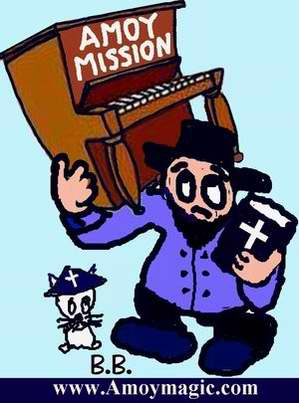 Please
share any relevant biographical material and photos for the website and
upcoming book. All text and photos will remain your property, and
photos will be imprinted to prevent unauthorized use.
Please
share any relevant biographical material and photos for the website and
upcoming book. All text and photos will remain your property, and
photos will be imprinted to prevent unauthorized use.
E-mail: amoybill@gmail.com
Snail Mail: Dr. William Brown
Box 1288 Xiamen University, Xiamen, Fujian PRC 361005
![]() Favorite
Fujian Sites
Favorite
Fujian Sites ![]() Fujian
Foto Album
Fujian
Foto Album ![]() Xiamen
Xiamen
![]() Gulangyu
Gulangyu
![]() Fujian
Guides
Fujian
Guides ![]() Quanzhou
Quanzhou
![]() Zhangzhou
Zhangzhou
![]() Longyan
Longyan
![]() Wuyi
Mtn
Wuyi
Mtn ![]() Ningde
Ningde
![]() Putian
Putian
![]() Sanming
Sanming
![]() Zhouning
Zhouning
![]() Taimu
Mtn.
Taimu
Mtn. ![]() Roundhouses
Roundhouses
![]() Bridges
Bridges
![]() Jiangxi
Jiangxi
![]() Guilin
Guilin
![]() Order
Books
Order
Books![]() Readers'
Letters New: Amoy
Vampires! Google
Search
Readers'
Letters New: Amoy
Vampires! Google
Search
Last Updated: October 2007
AMOY
MISSION LINKS
![]()
![]() A.M.
Main Menu
A.M.
Main Menu
![]() RCA
Miss'ry List
RCA
Miss'ry List
![]() AmoyMission-1877
AmoyMission-1877
![]() AmoyMission-1893
AmoyMission-1893
![]() Abeel,
David
Abeel,
David
![]() Beltman
Beltman
![]() Boot
Family
Boot
Family
![]() Broekema,
Ruth
Broekema,
Ruth
![]() Bruce,
Elizabeth
Bruce,
Elizabeth
![]() Burns,
Wm.
Burns,
Wm.
![]() Caldwells
Caldwells
![]() DePree
DePree
![]() Develder,
Wally
Develder,
Wally
![]() Wally's
Memoirs!
Wally's
Memoirs!
![]() Douglas,
Carstairs
Douglas,
Carstairs
![]() Doty,
Elihu
Doty,
Elihu
![]() Duryea,
Wm. Rankin
Duryea,
Wm. Rankin
![]() Esther,Joe
& Marion
Esther,Joe
& Marion
![]() Green,
Katherine
Green,
Katherine
![]() Gutzlaff,
Karl
Gutzlaff,
Karl
![]() Hills,Jack
& Joann
Hills,Jack
& Joann
. ![]() Hill's
Photos.80+
Hill's
Photos.80+
..![]() Keith
H.
Keith
H.![]() Homeschool
Homeschool
![]() Hofstras
Hofstras
![]() Holkeboer,
Tena
Holkeboer,
Tena
![]() Holleman,
M.D.
Holleman,
M.D.
![]() Hope
Hospital
Hope
Hospital
![]() Johnston
Bio
Johnston
Bio
![]() Joralmans
Joralmans
![]() Karsen,
W&R
Karsen,
W&R
![]() Koeppes,
Edwin&Eliz.
Koeppes,
Edwin&Eliz.
![]() Kip,
Leonard W.
Kip,
Leonard W.
![]() Meer
Wm. Vander
Meer
Wm. Vander
![]() Morrison,
Margaret
Morrison,
Margaret
![]() Muilenbergs
Muilenbergs
![]() Neinhuis,
Jean
Neinhuis,
Jean
![]() Oltman,
M.D.
Oltman,
M.D.
![]() Ostrum,
Alvin
Ostrum,
Alvin
![]() Otte,M.D.
Otte,M.D.![]() Last
Days
Last
Days
![]() Platz,
Jessie
Platz,
Jessie
![]() Pohlman,
W. J.
Pohlman,
W. J.
![]() Poppen,
H.& D.
Poppen,
H.& D.
![]() Rapalje,
Daniel
Rapalje,
Daniel
![]() Renskers
Renskers
![]() Talmage,
J.V.N.
Talmage,
J.V.N.
![]() Talman,
Dr.
Talman,
Dr.
![]() Veenschotens
Veenschotens
. ![]() Henry
V.
Henry
V.![]() Stella
V.
Stella
V.
. ![]() Girard
V.
Girard
V.
![]() Veldman,
J.
Veldman,
J.
![]() Voskuil,
H & M
Voskuil,
H & M
![]() Walvoord
Walvoord
![]() Warnshuis,
A.L.
Warnshuis,
A.L.
![]() Zwemer,
Nellie
Zwemer,
Nellie
![]() Fuh-chau
Cemetery
Fuh-chau
Cemetery
![]() City
of Springs
City
of Springs
(Quanzhou, 1902!!)
![]() XM
Churches
XM
Churches ![]()
![]() Church
History
Church
History ![]()
![]() Opium
Wars
Opium
Wars
![]() A.M.
Bibliography
A.M.
Bibliography
![]() YMCA
Volunteer!
YMCA
Volunteer!
![]() XICF
Fellowship
XICF
Fellowship![]()
![]() Temples
Temples![]()
![]() Mosques
Mosques
![]() Christ
in Chinese
Christ
in Chinese
Artists'
Eyes
DAILY LINKS
![]() FAQs
Questions?
FAQs
Questions?
![]() Real
Estate
Real
Estate
![]() Shopping
Shopping
![]() Maps
Maps
![]() Bookstores
Bookstores
![]() Trains
Trains
![]() Busses
Busses
![]() Car
Rental
Car
Rental
![]() Hotels
Hotels
![]() News
(CT)
News
(CT)
![]() Medical
& Dental
Medical
& Dental
![]() Expat
Groups
Expat
Groups
![]() Maids
Maids
![]() Phone
#s
Phone
#s
EDUCATION
![]() Xiamen
University
Xiamen
University
![]() XIS(Int'l
School)
XIS(Int'l
School)
![]() Study
Mandarin
Study
Mandarin
![]() CSP(China
Studies)
CSP(China
Studies)
![]() Library
Library
![]() Museums
Museums
![]() History
History
DINING ![]() Tea
Houses
Tea
Houses
![]() Restaurants
Restaurants
![]() Asian
Asian
![]() Veggie
Veggie
![]() Junk
Food
Junk
Food
![]() Chinese
Chinese
![]() Italian
Italian
![]() International
International![]()
![]() Visas
4 aliens
Visas
4 aliens
RECREATION
![]() Massage!
Massage!
![]() Beaches
Beaches
![]() Fly
Kites
Fly
Kites
![]() Sports
Sports
![]() Boardwalk
Boardwalk
![]() Parks
Parks
![]() Pets
Pets
![]() Birdwatching
Birdwatching
![]() Kung
Fu
Kung
Fu ![]() Hiking
Hiking
![]() Music
Events
Music
Events
![]() Cinema
Cinema
![]() Festival&Culture
Festival&Culture
![]() Humor&
Humor&![]() Fun
Fotos
Fun
Fotos![]()
BUSINESS
![]() Doing
Business
Doing
Business
![]() Jobs!(teach/work)
Jobs!(teach/work)
![]() Hire
Workers
Hire
Workers
![]() Foreign
Companies
Foreign
Companies
![]() CIFIT
(Trade Fair)
CIFIT
(Trade Fair)
![]() MTS(Translation)
MTS(Translation)
![]()
Back to Top
